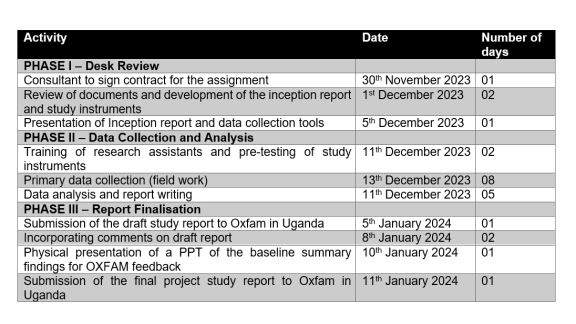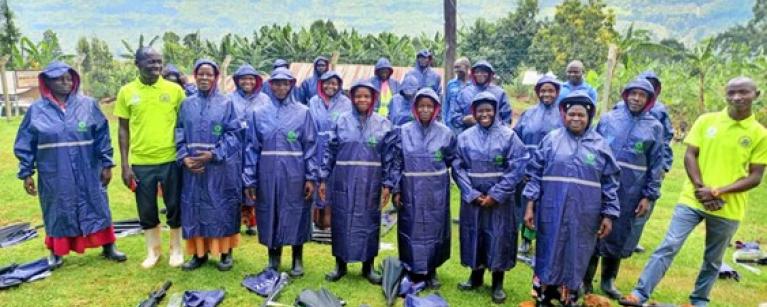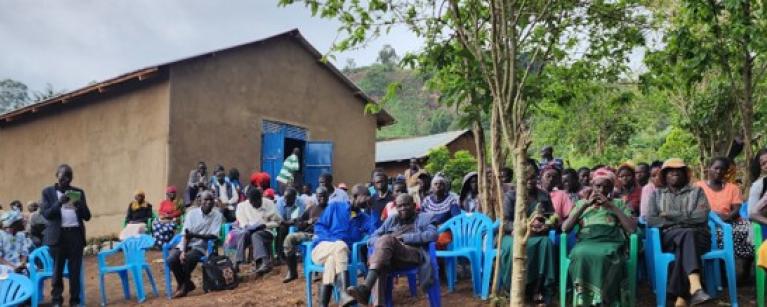1. Background about Oxfam in Uganda
Oxfam started working in Uganda in the 1960s. Since then, we have implemented both development and humanitarian programs to support practical and innovative ways for people to lift themselves out of poverty. Oxfam envisions Uganda free of extreme inequality and injustice; a society where citizens and particularly women across all age groups claim and exercise their rights and responsibilities and can influence decisions that affect their lives. Our one country program is hinged on three thematic goals that aim to promote women’s rights, good governance and accountability, resilient livelihoods, as well as humanitarian preparedness and response. Oxfam also believes that besides saving lives, it is imperative to strengthen humanitarian capacity at a local level. This would ensure better, quicker and cost-effective preparedness and response to humanitarian situations. Hence, the organisation invests in actions that strengthen the capacity of local humanitarian actors in all our areas of work.
2. Information about the Project
In Uganda, consecutive poor seasonal food harvests and below-average livestock production, coupled with sharp increases in prices of food and essential non-food commodities caused widespread food insecurity in the refugee hosting districts. Between June and August 2022, 21% of the population (857,000 people) in refugee hosting districts experienced high levels of acute food insecurity (IPC Phase 3 and above). Of the total 12 districts analyzed, 9 districts were classified in IPC Phase 3 (Crisis), while the other three were classified in IPC Phase 2 (Stressed). Zombo and Terego were among these classified under phase 2( stressed) this justified the selection of these districts by Oxfam under this partnership.
With funding from the Norwegian Agency for Development Cooperation (NORAD), Uganda was selected to implement a 12 month food security project for refugees and host communities in the West Nile districts of Zombo and Terego titled ‘Combating Food Insecurity’ among the most vulnerable groups in six counties”. Oxfam with its partners; Youth Social Advocacy Team (YSAT), International Foundation for Recovery and Development (IFRAD) and Agency For Community Empowerment (AFCE) will reach at least 17,000 direct beneficiaries in two (2) target districts (Terego and Zombo) in the West Nile region, through interventions designed to improve food security through increased access and availability of nutritious food for most vulnerable households.
3. Project objectives and expected outcomes
The NORAD food security project will work towards the following three end-of-project objectives, and their respective expected outcomes;
Overall Objective: Improve food security through increased access and availability of nutritious food for 17,000 of the most vulnerable individuals in Uganda
Specific Objective 1: Increased local climate-resilient food production and income of small-scale food producers
Expected Outcomes
- Skills and capacities of 9,600 individuals (50% women) on climate-resilient food production and other income opportunities strengthened
- Climate-resilient food production enhanced through provision of agricultural inputs and improvement of local infrastructure
- Income of women and youth increased through support to income-generating activities
Specific Objective 2: Reduction in scale of the hunger crisis and malnutrition in target areas
Expected Outcomes
- Increased access to basic food through cash-based programs.
4. Purpose and Objective of the study
4a. Purpose of the Baseline Study
In order to effectively measure the progress in achieving the objective of this Combating Food Insecurity project, Oxfam Uganda is aiming to hire a consultant to conduct the baseline assessment in targeted intervention area of Zombo and Terego Districts in West Nile region.
The baseline will outline the prevailing situation with regard to above project outcomes. This survey will gather information about the existing current regional and district level data on the food security situation as indicated above. The survey will help to establish the baseline of key indicators and set target/benchmark before the intervention so that the magnitude of change can be measured during the final evaluation to be carried out at the end of the project.
4b. Objective of the Study
The main objective of the study is to guide formulation of workable recommendations for appropriate actions. In order to achieve the above aims, the primarily study objectives include:
- To analyse the household’s level of engagement in sustainable agricultural income generating activities and their management practices
- To analyse household’s level of access to agricultural inputs
- To analyse household’s level of knowledge on food production and services
- To analyse household’s levels of income, expenditure and poverty status
- To analyse household’s per capita food consumption patterns of various food groups in one season
- To identify household’s food coping mechanisms
- To identify the factors influencing the dietary patterns at the household level (including food taboo)
- To identify the current dietary practices of the household
- To analyse household’s level of access to functional local markets
5. Scope of Work
The study will cover two (2) targeted districts (Zombo and Terego) in the West Nile region of Uganda. The partners involved in this baseline study will include project implementing partners and all the key project stakeholders:
- Oxfam with its partners; Youth Social Advocacy Team (YSAT), International Foundation for Recovery and Development (IFRAD) and Agency For Community Empowerment (AFCE)
- District Leadership
- Refugee Welfare Councils
- OPM officials
- Beneficiaries
6. Study Methodology
A suitable and detailed methodology in line with the objectives of the study should be provided by the consultant at baseline study inception. The section should focus on how the study will be conducted. The expected approach should be described in enough detail to ensure that the study can easily be replicated by any other researcher in case of need.
The study methods you prefer should be sensitive to the target population (unit of analysis), and robust enough to provide adequate responses to the stated evaluation questions/research hypotheses. Overall, the methodology section should cover details of study design and approaches, sampling, sample size determination, data collection methods/instruments, data analysis techniques, plan for dissemination of study findings, and a statement on quality assurance and ethical considerations during the study.
The key responsibility for determining baseline study questions lies with the survey lead person (consultant). Nonetheless, the survey lead person will be expected to work with project staff and stakeholders to refine a set of key questions for the baseline study. This should lead to the development of an indicator matrix (the indicator checklist against tools to be developed), the designing of data entry templates as well as development of a data analysis plan. As a minimum, the indicators measured during the baseline survey will also be measured at the end of the Project evaluation in order to determine change. Training of data collectors in quantitative and qualitative methods of data collection will be done thoroughly before the exercise in order to ensure there is a common understanding of the data to be collected from all districts.
7. Reference Materials
Oxfam in Uganda will provide the analysis information gathered in the proposal writing process and the donor proposal as a basis for the evaluation. Any relevant documents used to date will also be included in the in-brief at Oxfam in Uganda head office.
The consultant is responsible for sourcing additional documents, government data and statistics available at the local level as part of the evaluation process. Also the consultant is advised to follow the data collection process to enable him/her be familiar with the process so as to write the quality report.
8. Study Outputs/Deliverables
This baseline study will have a number of products that are summarized below.
- The Study inception report that should contain comprehensive data gathering tools and guidelines which will be approved before the baseline commences, a data analysis plan, and clearly explained data collection methods.
- Cleaned quantitative and qualitative data sets.
- One draft of the report which will be circulated to all stakeholders. The report must be comprehensive and clearly structured (in simple English), that will provide a basis for rationale and justification with clear realistic recommendations.
- A PowerPoint presentation of the findings and recommendations to the Oxfam team at the head office as part of the validation
- An updated MEAL Framework with the agreed baseline values for different indicator levels along the results chain
- Final reports (which will incorporate feedback from all stakeholders). The report is to be submitted in soft and hard copy. Two copies of the hard copy should be in colour and neatly bound
The final report shall be submitted in the following format:
- Cover page
- Table of Contents
- Acknowledgements
- Acronyms and Abbreviations
- Executive summary
- Brief project overview
- Methodology
- Brief baseline design
- Key limitations to baseline data
- Sampling strategy
- Data analysis plan
- Evaluation Findings
- Conclusions and recommendations
- Outline of approach to utilize baseline findings.
- Lessons Learned from the Baseline Process
- Appendices (Notes on baseline findings, recommendations and follow-ups, Post survey action plan, survey questionnaire, checklists and instruments used for data gathering and analysis and other statistical data, etc.)
7. Timeframe and estimated working days
The assignment will be undertaken from 30th November 2023 to 11th January 2024, lasting a total of 24 working days from the date of signing the contract, stipulated in the table below.














